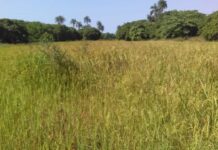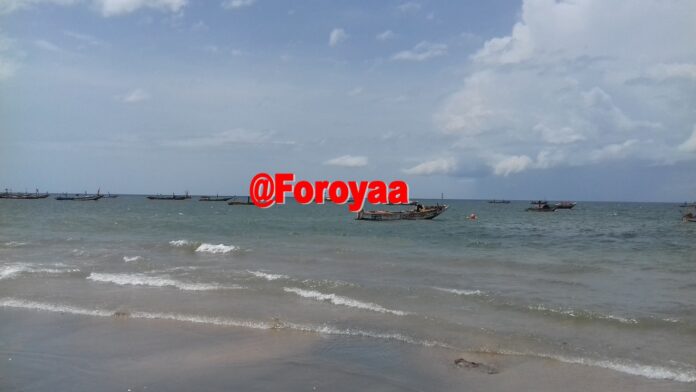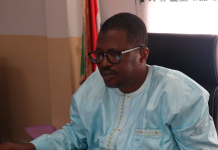By Yankuba Jallow
The Gambia’s dream of becoming a food self-sufficient nation is not farfetched if all plans, programs and projects geared towards achieving this goal are implemented to the letter, together with the political will and change of attitude of the people.
However, according to some farmers and fishermen, this dream is far from being achieved, considering the current situation of the governance situation of the country.
The modernization of agriculture and fisheries for sustained economic growth, food and nutritional security and poverty reduction, are top priorities of the current Government’s National Development Plan (NDP) blueprint.
According to the NDP, this is achievable through the promotion of vibrant fisheries and aquaculture sectors through research, sustainable management and the utilization of fish resources to enhance employment and create livelihood opportunities for the citizenry.
But the measures that should be employed by the Country to achieve this goal is the question because currently, Gambian farmers and fishermen as well as the agriculture and fisheries sectors, lack the requisite tools and innovation to engage in effective and meaningful production.
The 2020 Budget has not provided for the construction of irrigation infrastructure and land development. Farmers totally depend on rain-fed agriculture to sustain the economy. Horticulture which is one of the most relevant sub-sectors in agriculture has been overlooked by the government in the 2020 budget with zero financing.
However, the 2020 budget for the Ministry of Fisheries increased by a little over D15 million from D36 million in 2018, while that of agriculture saw a severe cut by more than 100 million in 2020 from more than half a billion in 2018.
After more than five decades of nationhood, the country is still heavily dependent on importation of food to feed herself. More than half the food consumed locally is imported as the production capacity of farmers is mainly for only family consumption, because the peasant farmers still use crude tools.
According to the NDP, the Government of the Gambia conceded that the poor performance of the agriculture sector, has deepened rural poverty and stalled GDP growth, which is barely able to keep up with population growth.
According to the Gambia Bureau of Statistics (GBoS), 48.6 % of the country’s 2.3 million people live below the poverty line of $1.25 a day. And the GBoS data contained in the last Integrated Household Survey (IHS), also states that one in every four Gambians in rural areas, live in extreme poverty.
Problems faced by farmers in the Gambia include poor road networks, lack of farm implements, poverty, lack of markets, lack of storage facilities for their produce, and lack of access to credit facilities.
Another issue that adds to the problem is that urban farming has significantly declined with the advent of real estate agencies that are largely uncontrolled. This causes access to land in urban and peri-urban areas increasingly problematic.
The two sectors of agriculture and fisheries are very crucial to the development of the country, particularly in the aspect of employment creation and poverty eradication.
However, the fisheries sector is dominated by newcomers who are non-Gambians with sophisticated fishing tools like trawlers. Gambian fishermen still use small boats and artisanal fishing methods which make it impossible to compete with these newcomers.
“It is very sad for us as Gambians. We have enough fish in our waters but we do not have enough fish in our markets. All the catches are taken outside the country,” Lamin Bah, a teacher and daily consumer of fish, told Foroyaa.
Bah gave this statement to this reporter when he was found at the Serrekunda Market looking worried.
“I am from the Bakoteh fish market but the fish there is very costly. I cannot afford it. I come to Serrekunda market to see whether I would be able to get fish here. The cost of fish is very expensive but the actual problem is you do not see good fish,” he said.
Rice, the main staple food for Gambians, has long been an important grain and is traditionally cultivated upland and in swamps.
The Gambia Government has not done much to mechanize agriculture despite promises to make the country a food self-sufficient state.
An analysis of the National Agriculture Sector Strategy (NASS) states that the area under cultivation for the six major cereal crops has been steadily declining from 206, 300 hectares in 2018, to 170, 130 hectares in 2019. An interconnection is also being detected for groundnut farming which is also in decline from 79, 923 hectares in 2018, to 54, 348 hectares in 2019.
Agricultural analysts told Foroyaa, that rice production in the country has missed the mark to match demand, as only about a quarter of the rice consumed locally is produced in the country, whilst three quarter comes from importation and aid.
Gambia’s style of budget allocation is mainly meant to maintain services. The budget does not provide for sustained investment in the country’s economic sectors and has not been able to reduce poverty or ensure food self-sufficiency.
“In The Gambia, it is cheaper to buy imported chicken than buy fish, even though we have enough fish in our waters,” Buba Baldeh of Pipeline said.
In his budget speech in 2019, the Minister of Finance and Economic Affairs Mambury Njie said the following:
“Government has invested considerably in agriculture to create a favorable and supportive environment for the farming community, particularly subsistence and smallholder producers and processors.”
Reacting to the above statement, Alagie Jarju, a farmer, told Foroyaa that floods, lack of fertilizers, farm implements and seeds, militate against all plans to ensure food self-sufficiency.
“We call on Government to ensure ‘sustained investment’ in agriculture, in order to address the food security [problems],” Jarju said.
Alieu Jarju, a resident of Tujereng, said the poverty among farmers is mainly caused by lack of farm equipment and implements.
“You do not expect a farmer who still uses traditional farming methods and tools to make it. This is the problem,” Jarju asserted. He said Government needs to provide communities with tractors.
Alagie Sowe, a farmer in the Central River Region (CRR), said without the right tools, farming becomes a waste of time and energy.
“You need tools to farm. We still use our traditional methods and tools that our forefathers left us with. Government needs to invest and provide us with the right tools. We need tractors and other farm implements and equipment to expand production.
Sowe said farmers in the Gambia have the potential to feed the nation but they cannot do so due to lack of farm implements.
Government’s intervention in the form of projects affect only a small section of the farming community which is more than half of the country’s entire population of 2.3 million.
The country has arable land for the cultivation of rice and other staple foods and also has the human resource to work on these lands. However, getting the necessary resources has always been a challenge.
The Ministry of Fisheries and the FAO implemented a project for improved fish smoking through the construction of the FAO-Thiaroye Technology Fish Smoking Facility in Gunjur, in 2018.
The same year Government signed a six-year fishing agreement with the EU allowing several European fishing vessels to take several tons of the country’s fish out of Gambian waters, for less than a million euros annually.
Meanwhile, almost all fish landing sites in the country have dilapidated structures.
Baboucar Saine, a retired fisherman said he chucked up fishing due to lack of proper fishing gears.
“The boat I was using for fishing was a medium size one that could not go deep into the sea. Most of the time when I went out to sea, I came back with little or no catch,” Saine said.
He explained that his boat uses fuel and most of the time he goes fishing, he ends up losing income, because his daily catch does not commensurate with the cost of fuel and other expenses.
“I have people working for me. I have to give them something. Things have not been going on well for us and so we have now decided to quit fishing. We cannot compete with the Senegalese and the Chinese in the water. They have bigger boats and trawlers and they can go far out at sea. We (the local fishermen) do not get anything now,” Saine said.
Alagie Babou, another fisherman in Tanji, said if the fisheries sector is properly managed, it can transform the country’s economy and propel the Gambia as a model in West Africa.
“There are prospects in the fisheries sector. I have been working here for twenty-seven years now. I know what is out there. It can generate revenue for the nation and boost the country’s economy that one cannot imagine. But the Government is not doing any serious investment in this sector,” Babou said.
He said local fishermen cannot thrive in the presence of the foreign new comers who are Senegalese, Chinese and Europeans.
“These foreigners are more prepared and better equipped for fishing while our local fishermen have small boats. Government should support local fishermen so that we can have enough fish in our markets to make the price affordable,” he said.
Babou said he stopped going to sea two years ago, and does not intend to return if the situation persists.
“Fishing is my career. It is what I know. But the reason why I quit is compelling. Government needs to take a position and support us (the local fishermen),” he said.
Alagie Jobe, another fisherman, said: “We only hear promises of support but it has never been forthcoming. Countries are investing in their fisheries sector because it has the potential of transforming their economies. But for the Government of the Gambia, they are only good at making promises. People want to work. But who can compete with the Senegalese and Chinese? They have big boats and trawlers. We are here struggling. No one is supporting us.”



















